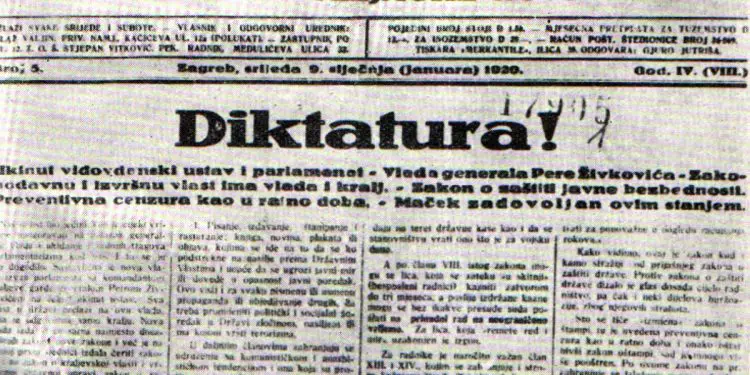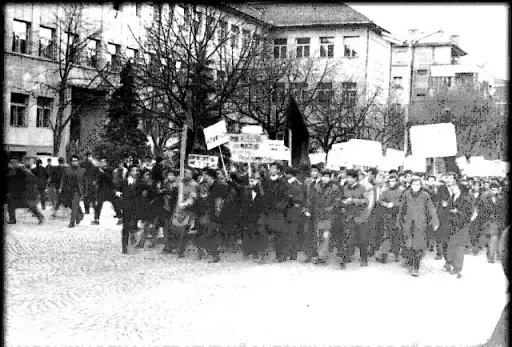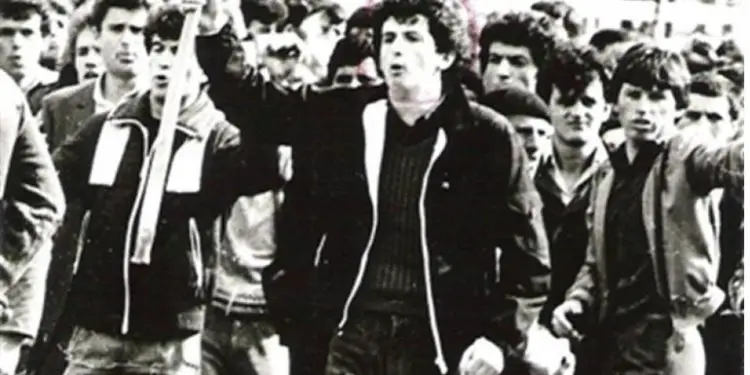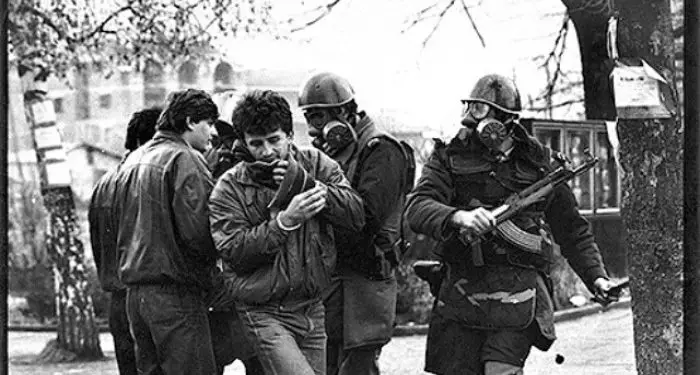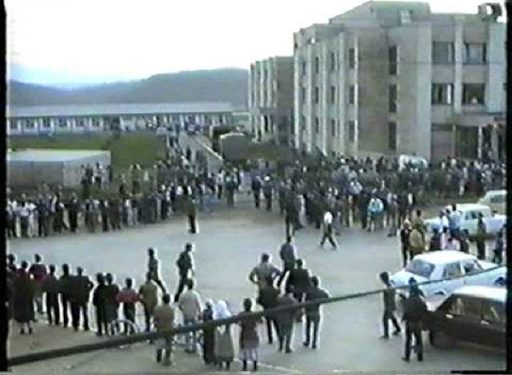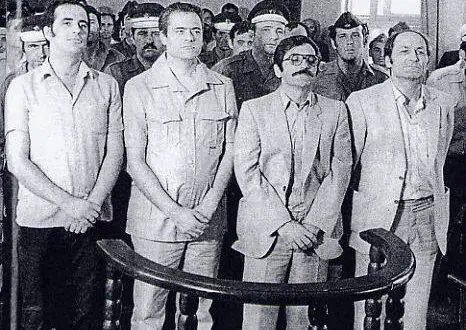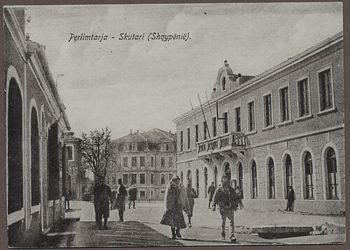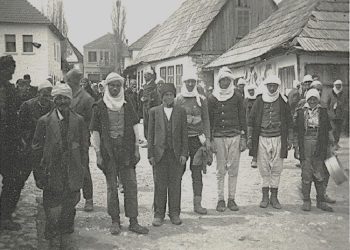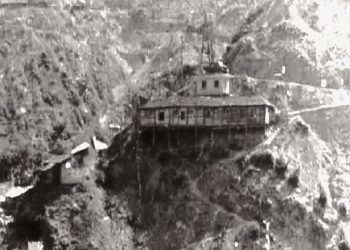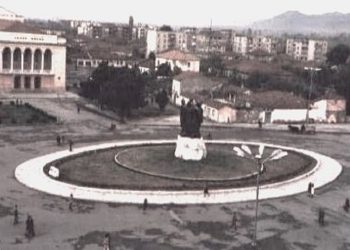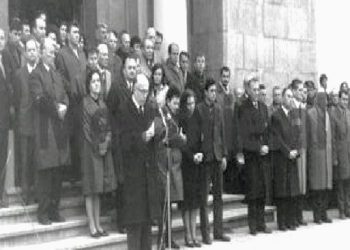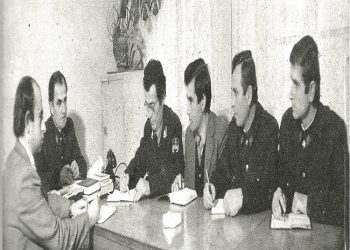Dashnor Kaloçi
Memorie.al publishes a previously unknown archival document extracted from the Archive of the Minister of Foreign Affairs in Tirana dated May 30, 1989, where a full article is given to the Belgrade newspaper “Borba”, where its author, Dragan … After accusing the well-known Albanian professor from Tirana, Bujar Hoxha, as the author of hostile writings against Yugoslavia, after the events of protests and demonstrations in Kosovo in 1981, he accused the official Yugoslav authorities of allowing prof. dr. Hoxha and docent Burhan Çiraku, through the Kosovo Archive, to study and obtain photocopies of archival documents available to the Secretariat of Foreign Affairs of Belgrade, as they were also used by Enver Hoxha, in his “pamphlets” against Yugoslavia.
39 years ago, on March 11, 1981, in the capital of Kosovo in Pristina, student protests and demonstrations erupted at the University of Kosovo, which would later show solidarity with the entire Albanian people of Kosovo, supporting their sons and daughters. of them who came out of their dormitories and auditoriums on the streets, to demand more freedom and rights, like all the other peoples of Yugoslavia of that time.
Although official Belgrade managed to suppress them with police violence within the day, even taking the army to the streets, as it had not forgotten and kept fresh the 1968 Kosovo student protests (which were inspired by student protests throughout Europe and forced the Titoist regime to give Kosovo the status of Autonomous Province in 1974), the Albanian students of the University of Prishtina were reorganized again and a few days later, on March 26, came out again in demonstrations to protest their legal rights, but again faced the brutal violence that official Belgrade exercised against them, even removing tanks on the streets.
But although at first it seemed that those student protests were ending, a few days later, on April 1 and 2, they resumed to continue for a long time, so much so that it put the Titoist regime in Belgrade in a lot of trouble, as Kosovo and the protests students with whom all the Albanian people of that “autonomous province” had already joined, chanting the slogan “Kosovo Republic”, became the news of the day for all radio and television stations around the world. Where the most prestigious ones like: BBC, CCN, Associations Press, Reuters, etc., sent their correspondents to Kosovo, broadcasting live those already escalated protests that were drowned in blood by the Belgrade military vehicle.
According to many sources, in those protests and demonstrations that started very peacefully, 9 people were killed and 15 others were injured, while by the Serbian police forces, 2 were killed and 17 others were injured. Also, from some very reliable sources (such as the League of Kosovo Historians) even four years after those demonstrations, by the Belgrade secret services, about 4 thousand people were arrested and convicted (Kosovo Albanians), and by the 1990s, 183 Kosovo civilians had been killed, and 63 Albanian soldiers performing compulsory military service in the Yugoslav Army were brought dead to their homes, most of them with welded coffins.
It is also said that 1,346 Albanian soldiers and about 10,000 civilians were convicted in rigged trials, all on political charges. While these events are already known due to the international factor and their media that at that time widely covered them, somewhat unclear, not to say vague, has remained the role that official Tirana had in those events. Because, although the communist regime of Tirana led by Enver Hoxha, the events of ’81, “in the eyes of the world”, publicly and unreservedly supported them, calling the demands of the students and the Albanian population of Kosovo right, otherwise acted and treated Kosovar emigrants who had come to their homeland illegally, since the official break-up of Tirana with Belgrade in 1949.
Where most of them had ended up in prisons and internments, being accused of being “UDB agents”, even in the early 1950s, so large was the number of Kosovar emigrants coming to Albania illegally. so much so that official Tirana opened an internment camp for them, in the village of Llakatund in Vlora. But, as an irony of fate, the communist regime of Tirana led by Enver Hoxha, unlike acting with our Kosovar brothers who came to their homeland to escape persecution and persecution by the theist regime of Belgrade, treated them like an example. Yugoslav emigrants fleeing their country and coming to Albania because they were persecuted by the Belgrade regime, for their Stalinist and pro-Enver Hoxha convictions, against the policy of Marshal Josif Broz Tito.
Towards these Yugoslav states, not only was a completely opposite attitude maintained towards the Kosovars, but they were also allowed a newspaper (in Albanian and Serbo-Croatian), as well as a daily program on Radio Tirana, but their representative in Albania was invited to all the congresses of the ALP (alongside Enver Hoxha), greeting “the achievements of Socialist Albania and the right policy of the ALP led by Enver Hoxha”?!
While these events already belonged to an earlier period, unlike what he had actually done with Kosovar emigrants who had come to Albania, where at the time of the events known as the “Kosovo Spring”, many of them continued to be in prisons and internments, official Tirana publicly supported in the international arena the just and legitimate demands of the Kosovo Albanian population, opposing the Titoist regime in Belgrade. The public speeches of Enver Hoxha are already known, which were broadcast with rage by the Albanian Radio-Television, the Tirana press headed by the largest newspaper “Zeri i Popullit”, the Albanian Telegraphic Agency, etc., up to the voluminous books in several volumes, entitled “What Kosovars say and want”, with summaries of the world press on the events in Kosovo.
It is said that; more than to protect Kosovo Albanians, in the events of ’81, official Enver Hoxha and Tirana “showed solidarity with Kosovars” and “denounced” the oppressive and discriminatory policy that official Belgrade was applying and exercising towards the Kosovo Albanian population , he did so after terribly hating Joseph Broz Tito, (his now deceased former master), who had gained a great name and fame in the world, (as the leader of the disengaged countries, where at his funeral in the beginning of May 1980, attended by about 150 heads of state, princes and kings from around the world), so much so that Mao Zedong’s Greater China, already under the leadership of Hua Kuo Fen, had become the greatest friend of Official Belgrade, shortly after the breakdown of Hoxha’s relations with communist Albania.
Not only that, but it is said that Enver Hoxha did not want Kosovo to be declared a republic, as he was not interested in the two Albanian states, where communist Albania would be defactorized and all the attention of the international factor could and would go from Kosovo, which although in The Yugoslavia of Tito’s followers would have received more attention and support from the international community. And exactly this, (as more paranoia), it was said that Enver Hoxha was afraid of the “incense devil”
In this context, just a short time after the events of the “Kosovo Spring”, to somewhat lower the image of Kosovars in the eyes of the Albanian people and for “domestic consumption”, Enver Hoxha resumed the sentences of Kosovar emigrants who were in Albania, imprisoned them on charges of a political nature, of the most varied, based on her as “UDB agents”. In this context, that is, the lowering of the image of Kosovars in the eyes of public opinion in Albania, while for years Kosovar emigrants were convicted as “UDB agents” and for “agitation and propaganda” only shortly after the events of the Spring of Kosovo ”, in 1983-’84, a group of Kosovar intellectuals emigrating to Albania were arrested and convicted (Namik Luci, Selim Kelmendi, Estref Kelmendi, Shefqet Kelmendi, etc., residing in the districts of Kruja, Lezha and Shkodra), accusing them as: “terrorists who wanted to kill the first Secretary of the Central Committee of the ALP, Comrade Enver Hoxha with the assassinations during his visit to the National Museum of Skanderbeg in Kruja in 1981”.
So, unlike what he actually did, in the position taken by Enver Hoxha and official Tirana publicly in support of the just and legal demands of the Kosovo Albanian population, where the most important was “Kosovo Republic”, it was said that a major and decisive contribution in the editorial articles published by “Zeri i Popullit”, there was Prof. Dr. Bujar Hoxha, (son of the well-known patriot, Hoxha Kadri Prishtina, former Chairman of the Committee for the Defense of Kosovo, close friend and collaborator of Fan Noli, Luigj Guralkuqi and Avni Rustemi since the 20s of the last century) , who at that time was a lecturer at the State University of Tirana.
Based on the origin of his family (from Prishtina), prof. Bujar Hoxha, was a deep knower, both of the history of Kosovo and all of Yugoslavia, and of the policy that the Titoist regime of Belgrade, had pursued since the War against the peoples and nations that it had included not without violence since 1945, in the Yugoslav Federation.
In this context, it seems that official Belgrade was more hurt by such articles, where they knew that it was the hand of prof. Hoxha (son of Hoxha Kadri, their old enemy since the 1920s), which was openly stated by the Belgrade newspaper “Borba”, dated May 30, 1989, where its author , journalist Dragan…., in a long article, after openly accusing prof. Bujar Hoxha, as: “author of hostile writings and his work against Yugoslavia since Turkey where he served as a diplomat in Tirana, after the events of March 1981”, he also raises accusations against the official Yugoslav authorities, who had allowed him to through the Kosovo Archive, to study and obtain archival documents from the Diplomatic Archive of the Belgrade Secretariat of Foreign Affairs, as according to him, they were also used by Enver Hoxha.
For more on the above and others, we know the archival document that Memorie.al has managed to provide at the Archive of the Ministry of Foreign Affairs in Tirana, (declassified), where the full article of the newspaper “Borba” of Belgrade is given, which at that time was also uncovered by the Albanian Telegraphic Agency. Which Memorie.al publishes on the occasion of the anniversary of the Kosovo demonstrations that started exactly like today 39 years ago, on March 11, 1981, for which the former charismatic leader of Bosnia, Franio Tudjman, had expressed: “The first to teach us how to put the pickaxe in the old Yugoslavia were the protests of Kosovo Albanians and then those of other republics.”
The article of the Belgrade newspaper “Borba” dated May 30, 1989, against prof. dr. Bujar Hoxha
ALBANIAN TELEGRAPHY AGENCY 30 May 1989 FILE SERVICE
How Kosovo and Albania have cooperated in scientific studies
ALBANIANS IN THE DIPLOMATIC ARCHIVE
Professor Bujar Hoxha, advisor to Enver Hoxha and one of the strategists of Albania’s paternalistic policy towards Kosovo, in 1979 was given the opportunity to study, through the Kosovo Archive, materials of Serbian diplomacy, since the beginning of the century in the Service of the Secretariat of Federal Foreign Office, for documentary and archival issues.
The material of the great Albanian state policy, expressed, among other things, in the slogan “Dardania belongs to the Dardanians”, found a suitable ground in the intensive “interstate” cooperation between Kosovo and Albania, especially in the part of cooperation and in the cultural and educational plan, in the time of the escalation of Albanian national-separatism in Kosovo, in the seventh decade of this century.
Following the instructions of the Political Bureau of the ALP of 1952, for the tasks of Albanian historiography and the platforms of the Central Committee of the ALP, “For the tradition of our people”, as well as the numerous speeches of Enver Hoxha on this topic, The Albanian Academy of Sciences in Tirana concretized this.
In its organ, “Iliria”, (No.6.1976), strongly criticizes Albanian scientists for their insufficient engagement in this plan, ie in the land of Dardania. At that time, they wrote: “Our future studies should be extended to Dardania, which is an important Illyrian province. The insufficient interest that our scientists have shown so far in this region, has made possible the creation of a gap and for some time will leave room for arbitrary concepts and interpretations for a series of problems of Illyrian history “.
For those who know history well, Dardania means today’s Kosovo and a large part of Macedonia, southern and western parts of Serbia. Now, when the many Yugoslav mistakes are being revealed regarding Kosovo and its policy towards Albania, a policy which has always been designed and implemented from there, with the aim of hegemony of the two parts of the Albanian people, was clearly proven by many documents on how Albanians from Albania have studied their “history” in the territory of Yugoslavia. A more typical example of naivety, carelessness, laziness or something else Yugoslav, is the opportunity to study in the Diplomatic Archive of the Secretariat of Foreign Affairs of Yugoslavia, advisor to Enver Hoxha and one of the strategists of Albania’s paternalistic policy towards Kosovo, prof… dr. Bujar Hoxha.
The Secretariat of the University of Prishtina, with its act, No. 243 of 5 February 1979, requested from the Federal Secretariat of Foreign Affairs of Belgrade, to make it possible for professors from Albania, scientists of the University of Tirana, prof. Bujar Hoxha and docent, Bujar Çiraku, to deal with the studies of the Archive for the “Albanian National Revival”. Referring to the agreement on scientific-educational cooperation, the rector of the University of Prishtina, prof. dr. Feriz Krasniqi, who signed the request, requested that these professors’ study:
Political events in Albania from 1882 to 1912.
Materials on the economic and social situation of Albania in the nineteenth and early twentieth centuries.
Biographical data on well-known personalities of the Albanian National Renaissance.
Since your Archive has many materials from these fields, please, within your capabilities, make it possible for the scientific staff of the University of Tirana (who currently work in the Archive of Kosovo) to work with you about one month. A professor from the University of Prishtina will be with them “, it is said in this letter. The companion of these two Albanian scientists was Sadulla Breztovci.
“Importance of studies”
Upon receiving the request from the University of Prishtina, the Service for Documentary and Archival Affairs, as it is officially called the Diplomatic Archive of the Federal Secretariat of Foreign Affairs, asked the Undersecretary of the Federal Secretariat of Foreign Affairs to approve the review for Albanian scientists, and selection of documents. This request was made on March 1, 1979, 25 days after receiving the request from Kosovo and it was signed by the chief, Lazar Zharkovic.
During the time of 25 days, the employee of the Archive, Dragutin Koçoviçi, had enough time to “check” what materials related to the topic “Albanian Renaissance” are in the Diplomatic Archive of the Federal Secretariat of Foreign Affairs, and this request of the Undersecretary of concretizes: In the Diplomatic Archive there are documents for the above-mentioned topic and these are in the funds:
YES MID, Kingdom of Serbia, 1882-1912.
Administrative-Legal Section, 1882-1912.
Summary V. Jovanovi..
Representation of the Kingdom of Serbia in Stari Grad and London 1882-1912.
Consulate of the Kingdom of Serbia in Prishtina 1900-1912 and Consulate in Skopje, 1891.
In addition, it is noted that the archive materials are allowed for use according to the regulation on the conditions for use and registration of the archive materials of the Federal Secretariat of Foreign Affairs.
Based on this request addressed to the Service for Documentary and Archival Affairs, the Undersecretary of the Federal Secretariat of Foreign Affairs, Mirko Kosin, took the decision which allows (comrades Bujar Hoxha and Burhan Çiraku from Tirana, Albania, to study in the Diplomatic Archive), as proposed by the service.
Prior to that, on February 26, 1979, the First Directorate of the Federal Secretariat of Foreign Affairs had given its consent and informed the college of the Federal Secretariat. The consent on behalf of the First Directorate was signed by T. Troja. The Service for Documentary and Archival Affairs of the Secretariat of Foreign Affairs, on November 6, 1980, sends an act, which was signed by the Ambassador, Mihajlo Stevovic and initialed by the employee of the Archive, Dragutin Kicovi, to the First Directorate of the Federal Secretariat of Foreign Affairs, with no. 623/15, where he informs them that as an appendix are made available materials selected by prof. Bujar Hoxha and Burhan Çiraku for the period 1910, 1911, 1912.
It is also noted that the First Directorate of the Federal Secretariat of Foreign Affairs, by diplomatic mail, sent the selected documents to the Yugoslav embassy in Tirana, proposing to whom and in what way it will be handed over to the Albanians.
Finally followed the invoice that the Secretariat Federation of Foreign Affairs, sent on May 29, 1980, with no. 217 / 15-79, University of Prishtina, requesting the University to pay to the current account of the Federal Secretariat of Foreign Affairs, 60811-637-5218, the amount of 4,110,000 dinars, for the photocopy of 1370 sheets of documents ( that in the Archive of Diplomatic Documents of the Federal Secretariat of Foreign Affairs, made available for your needs, Sadulla Brezovic and for the needs of the University of Tirana, Bujar Hoxha and Burhan Çiraku).
The bill was also signed by Ambassador Mihajlo Stevovic and signed by Dragutin Kicovic.
“The importance of these studies in the Diplomatic Archive in the Diplomatic Secretariat of Foreign Affairs, could be understood only when it was learned who is prof. dr. Bujar Hoxha, (from the University of Tirana).
He was born in Kosovo, where he has many family and friendship ties. In the wake of the growing escalation of Albanian national-separatism in Kosovo, he was the Director of the Institute of Marxism-Leninism, where Nexhmije Hoxha, the wife of Enver Hoxha, also worked.
Bujar Hoxha was the first advisor to Enver Hoxha, on Kosovo issues and one of the creators of the policy of paternalism. He has also prepared speeches for Enver Hoxha.
During his arrival in Yugoslavia, in the framework of the cooperation between the two universities, Prishtina and Tirana, he had many interesting meetings with a large number of professors of Albanian nationality. After the counter-revolutionary events of 1981, when the cooperation with the University of Tirana was terminated, Bujar Hoxha became one of the most widely circulated authors of hostile pamphlets against Yugoslavia. He then transferred as a senior diplomatic official to Ankara, Turkey, from where he organized hostile work against Yugoslavia. After a car accident, he returned to Albania.
Even prof. Burhan Çiraku, after 1981, joined the anti-Yugoslav campaign. Since, at the same time, Bujar Hoxha and Burhan Çiraku studied in the Kosovo Archive, the Kosovo Archive, with the letter no. 622, dated 10.XII.1979, requested from the Diplomatic Archive of the Federal Secretariat of Foreign Affairs, the approval for the continuation of the interrupted study work. Justifying its request, the Kosovo Archive stated that it was once allowed to study and microfilm in this Archive, mainly through the employee of the Diplomatic Archive, Dragutin Kicovic and in particular studies were made in 1969 and 1970 in the Political Section for the period up to in 1921. At the request of the Kosovo Archive, signed by the director Fejzullah Çerkini, the termination was due to lack of financial means,” so considering that the necessary financial means were provided thanks to the provincial community for the work scientific, we are free to turn to this Archive for permission”.
In addition to this act, a photocopy of the act of the Archives of Kosovo and Metohija number 612 of December 11, 1969 is brought, which also, ten years ago, was sent to the History Section of the Federal Secretariat of Foreign Affairs. At that time, it was found that the Diplomatic Archive allowed the Kosovo Archive to view and register documents in the Political Section and in the Educational-Propaganda Section of the Kingdom of Serbia. It also mentioned allowing microfilming. The act also states that the selection of about 5,000 documents of several thousand pages for the needs of the Kosovo Archive, was made during two years by Dragutin Kicovic, director of the Diplomatic Archive of the Federal Secretariat of Foreign Affairs. This request was signed by the director of the Kosovo Archive, Ismet Dërmaku.
Materials for Enver Hoxha as well
On the basis of a prior request of the Kosovo Archive, the Documentary and Archival Service sent on December 2, 1979, an act to the Undersecretary of the Federal Secretariat for Foreign Affairs, requesting approval for the Kosovo Archive to be allowed to see the Diplomatic Archive. especially for Dragutin Kicovic, Head of the Section for Protection and Preservation of Materials in the Federal Secretariat of Foreign Affairs, to study outside the working hours for the needs of the Kosovo Archive.
“We propose to approve the continuation of the work by the Kosovo Archive and Comrade Kicovic for the study, regulation and microfilming of the materials of the Archive related to the past of Kosovo. In accordance with the relevant provisions, the Archive of Kosovo may not publish the material provided in this way in a summary of documents or provide it for use to foreign researchers, without the consent of the Federal Secretariat of Foreign Affairs “, it is stated in this document that signed by Ambassador Mihajlo Stevovic.
The Undersecretary of the Federal Secretariat of Foreign Affairs, Aleksandar Voinovic, agreed. After receiving this consent, the Service for Documentary and Archival Affairs on January 11, 1980, number 1202/15 informs the Kosovo Archive that: the study of the Archive materials related to the history of Kosovo in the Diplomatic Archive has been approved and that this work will be done by Dragut Kicovic, overtime.
Dragutin Kicovic for all his work for the needs of the Kosovo archive since the early seventies, and later, has been well rewarded. The honorarium book of the Kosovo Archive determines exactly how much Kicovic was paid for each study, photocopy and microfilmed pages in the Diplomatic Archive.
Could it be a coincidence that the Kosovo Archive and the Diplomatic Archive of the Federal Secretariat of Foreign Affairs have been used by professors from Albania, while the Kosovo Archive requested permission from the Diplomatic Archive to view materials that were directly related to them? materials for which permission was requested for Albanian professors. By no means – No.
As later convinced after 1981, even the wider Yugoslav political public, Albanian diplomats used some of these materials for their anti-Yugoslav stances at the United Nations, and some of them were used by Enver Hoxha himself in the pamphlets of as is the case with the Titoists.
The statements of many politicians, who held leading state and party positions in Yugoslavia, at the time of the escalation of Albanian nationalism and separatism in Kosovo, that they had no information and did not know what was happening in Kosovo, are simply an attempt to absolve themselves of responsibility. by itself.
He even expressed surprise at how the counter-revolution took place. Such is the content of the question itself: In the name of which principles was accepted to establish cultural, sports, tourism, etc. relations between the Socialist Autonomous Province of Kosovo and the Socialist People’s Republic of Albania.
Meanwhile, many things were known. It was known that Albanians from Albania had managed to gain access to the Diplomatic Archive of the Federal Secretariat of Foreign Affairs, which, as we think, has been meaningless in Yugoslav-Albanian relations./Memorie.al
XH.Ke / M / ATSH /
(Taken from the newspaper “Borba” dated April 20, 1989 written by Dragan….)




